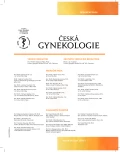Medical ethical moral and legal aspects of Jehovah´s Witnesses operations
Authors:
Milan Kudela 1,3
; R. Pilka 1; P. Dzvinčuk 1; R. Marek 1; O. Klementová 2
Authors‘ workplace:
Gynekologicko-porodnická klinika LF UP a FN, Olomouc, přednosta prof. MUDr R. Pilka, Ph. D.
1; Klinika anestezie a resuscitace a intenzivní medicíny LF UP a FN, Olomouc, přednostka MUDr. O. Klementová
2; Ústav zdravotnických věd, FHS UTB, Zlín
3
Published in:
Ceska Gynekol 2019; 84(1): 23-27
Category:
Overview
Objective: To point out principles of blood sparing surgery. Medical ethical moral and legal aspects of operations on Jehovah’s Witnesses.
Design: Retrospective clinical study. Review of articles.
Setting: Dept. of Gynecology and Obstetrics, University Hospital, Olomouc; Dept. of Health Care Sciences, Faculty of Humanities, Tomas Bata University Zlín.
Materials and methods: 72 Jehovah’s Witnesses patients were operated on for various benign and malignant gynecological diseases since 2007–2017. All patiens were operated according to the rules of blood sparing surgery.
Results: There were no excesive blood loss at any of the operations. The estimated blood loss was between 10 to 550 ml.
Conclusions: The main principles of blood sparing surgery should be applied not only for Jehovah’s Witnesses but for all patients. Even if the blood transfusion is the last resort for excessive blood loss during complicated operations it always carries some health risks. There are also the economical aspects. Blood transfusions should be therefore used only at very rare occasions. Jehovah’s Witnesses refuse blood transfusions at all even if it is the only life saving resort. Our legislation deal with this problem but there are also moral and ethical aspects. The attitude of gynecological surgeons how to solve this problem differ a great deal.
Keywords:
Jehovah´s Witnesses operations – blood sparing surgery – medical ethical aspects
Sources
1. Belaouchi, M., Romero, E., Mazzinari, G., et al. Management of massive bleeding in a Jehovah’s Witness obstetrics patients: the owerhelming importace of a pre-established multidisciplinary protokol. Blood Transfusion, 2016, 14, p. 541–544.
2. Durnmousset, E., Chabrot, B., Rabischong, B., et al. Preoperative uterine artery embolisation (PUAE) before uterine fibroid myomectomy. Cardiovasc Intervent Radiol, 2008, 31, p. 514-520.
3. Nimesh, P., Nagarsheth, MD., Fahimeh, S. Bloodless surgery in gynecologic oncology. Mount Sinai J Med, 2009, 76, p. 589–597.
4. Pafko, P. Rozhovor s prof. MUDr P. Pafkem, DrSc. Moderní Gynek Porod, 2009, 18, 4, s. 643–647.
5. Rayburn,WF. Prevention and management of complications from gynecologic surgery. Obstet Gynec Clinics, 2010, 37, 3, p. 427–436.
6. Retamales, PA., Cardemil, HG. Benefits from the exercise of autonomy and informed consent: the example of Jehovah´s Witnesses. Rev Med Chil, 2009, 137, 10, p. 1388–1394.
7. Ringnes, HK. Refusal of medical blood transfusions among Jehova’s Witnesses: emotion regulations of the dissonance of saving and sacrificing life. J Relig Health, 2016, 55, p. 1672–1687.
8. Sagy, I., Jotkowitz, A., Barski, L. Reflections on cultural preference and internal medicine: the case of Jehovah’s Witnesses and the changing tresholds for blood transfusion. J Relig Health, 2017, 56, p. 732–738.
9. Santoso, JT., Saunders, BA., Grosshart, K. Massive blood loss and transfusion in obstetrics and gynecology. Obstet Gynecol Surv, 2005, 60, 12, p. 827–837.
10. Seidlová, D., Weinberger, V. Metody bezkrevné péče v gynekologii a onkogynekologii. Čes Gynek, 2014, 79, 6, s. 499–504.
11. Shander, A., Hofmann, A., Ozawa, S., et al. Aktivity-based costs of blood transfusions in surgical patients at four hospitals. Transfusion, 2010, 50, 4, p. 753–765.
12. Shander, A., Javidroozi, M., Perelman, S., Puzio, T., Lobel, G. From bloodless surgery to patients blood management. Mt Sinai J Med, 2012, 79, 1, p. 56–65.
13. Shiroki, R., Maruvama, T., Kusaka, M., et al. Robot-assisted laparoscopic partial nephrectomy using daVinci S-surgical system for localized renal tumor: report of initial five cases. Nihon Hinyokika Gakkai Zasshi, 2011, 102, 5, p. 679–685.
14. Simou, M., Thomakos, N., Zagouri, F., et al. Non-blood medical care in gynecological oncology: a review and update of blood conservation management schemes. World J Surg Oncol, 2011, 9, p. 142.
15. Yorozu, T. Jehovah´s Witness patients. Masui, 2010, 59, 9, p. 1149–1152.
16. Záleská, D. Právní podmínky respektování práva na odmítnutí krevní transfuze. Moderní Gynek Porod, 2009, 18, 4, s. 648–655
Labels
Paediatric gynaecology Gynaecology and obstetrics Reproduction medicineArticle was published in
Czech Gynaecology

2019 Issue 1
-
All articles in this issue
- Robotic paraaortic lymphadenectomy in oncogynecology. Double side docking of daVinci S system increases the success rates of high paraaortic lymph node dissection in endometrial cancer
- Obstetric anal sphincter injuries – review of our date between 2015–2017
- Medical ethical moral and legal aspects of Jehovah´s Witnesses operations
- Criteria for selecting a surrogate mother
- Psychosocial risk factors for emergency cesarean section
- The role of ultrasound in primary workup of cervical cancer staging (ESGO, ESTRO, ESP cervical cancer guidelines)
- Uterine microbiome and endometrial receptivity
- Cervical cerclage – history and contemporary use
- Endometriosis in pregnancy – diagnostics and management
- Diagnostics and modern trends in therapy of postpartum depression
- Urinary incontinence during pregnancy
- Fournier‘s gangrene and gliflozins in therapy of diabetes mellitus
- Devadesátiletí profesora Antonína Doležala
- Czech Gynaecology
- Journal archive
- Current issue
- About the journal
Most read in this issue
- Endometriosis in pregnancy – diagnostics and management
- Diagnostics and modern trends in therapy of postpartum depression
- Cervical cerclage – history and contemporary use
- Uterine microbiome and endometrial receptivity
